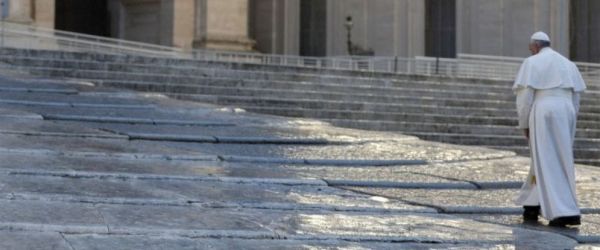The Gospel passage this Sunday (Lk 9:18-24) calls us to once again confront Jesus “face to face”, so to speak. In one of the rare quiet moments when he is alone with his disciples, he asks them: “Who do the people say that I am?” (v. 18). They responded to him, saying: “John the Baptist; others say Elijah; others say one of the ancient prophets who has risen” (v. 19). Therefore, people esteemed Jesus and considered him to be a great prophet, but they were not yet aware of his true identity, that is, that He was the Messiah, the Son of God sent by the Father for the salvation of everyone.
Then Jesus directly addresses the Apostles — because this is what most interests him — asking: “But who do you say that I am?”. Immediately, on behalf of everyone, Peter responds, “The Christ of God” (v. 20), that is to say: You are the Messiah, the Anointed of God, sent by Him to save his people according to the Covenant and the promise. Therefore Jesus realizes that the Twelve, and Peter in particular, have received the gift of faith from the Father; and for this reason he begins to speak with them openly — this is how the Gospel puts it: “openly” — of what awaits him in Jerusalem. “The Son of Man must suffer many things”, he says, “and be rejected by the elders, the chief priests and the scribes, and be killed, and rise on the third day” (cf. v. 22).
These same questions are proposed to each of us today: “Who is Jesus for the people of our time?”, and more importantly: “Who is Jesus for each of us?”, for me, for you, for you, for you, and for you ...? Who is Jesus for each one of us? We are called to make Peter’s answer our own response, joyfully professing that Jesus is the Son of God, the Eternal Word of the Father, who became man to redeem mankind, pouring out the abundance of divine mercy upon it. The world needs Christ more than ever: his salvation, his merciful love. Many people feel an empty void around and within themselves — perhaps, at certain times, we do too —; others live in restlessness and insecurity due to uncertainty and conflict. We all need adequate answers to our questions, to our concrete questions. Only in Him, in Christ, is it possible to find true peace and the fulfillment of every human aspiration. Jesus knows the human heart better than anyone. This is why he can heal, giving life and consolation.
After concluding the dialogue with the Apostles, Jesus addressed everyone, saying: “If anyone wants to come after me, let him deny himself, take up his cross daily and follow me” (v. 23). This is not an ornamental cross or an ideological cross, but it is the cross of life, the cross of one’s duty, the cross of making sacrifices for others with love — for parents, for children, for the family, for friends, and even for enemies — the cross of being ready to be in solidarity with the poor, to strive for justice and peace. In assuming this attitude, these crosses, we always lose something. We must never forget that “whoever loses his life [for Christ] will save it” (v. 24). It is losing in order to win. Let us remember all of our brothers and sisters who still put these words of Jesus into practice today, offering their time, their work, their efforts and even their lives so as to never deny their faith in Christ. Jesus, through His Holy Spirit, gives us the strength to move forward along the path of faith and of witness: doing exactly what we believe; not saying one thing and doing another. On this path Our Lady is always near to us: let us allow her to hold our hand when we are going through the darkest and most difficult moments.
[Pope Francis, Angelus 19 June 2016]












